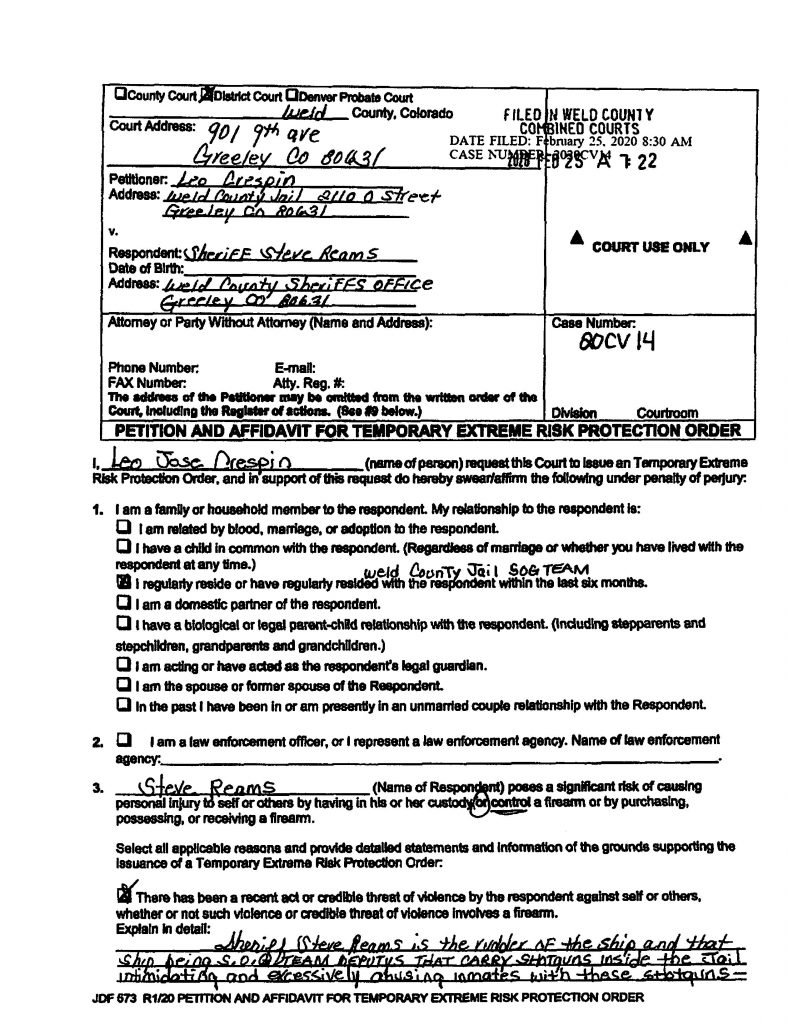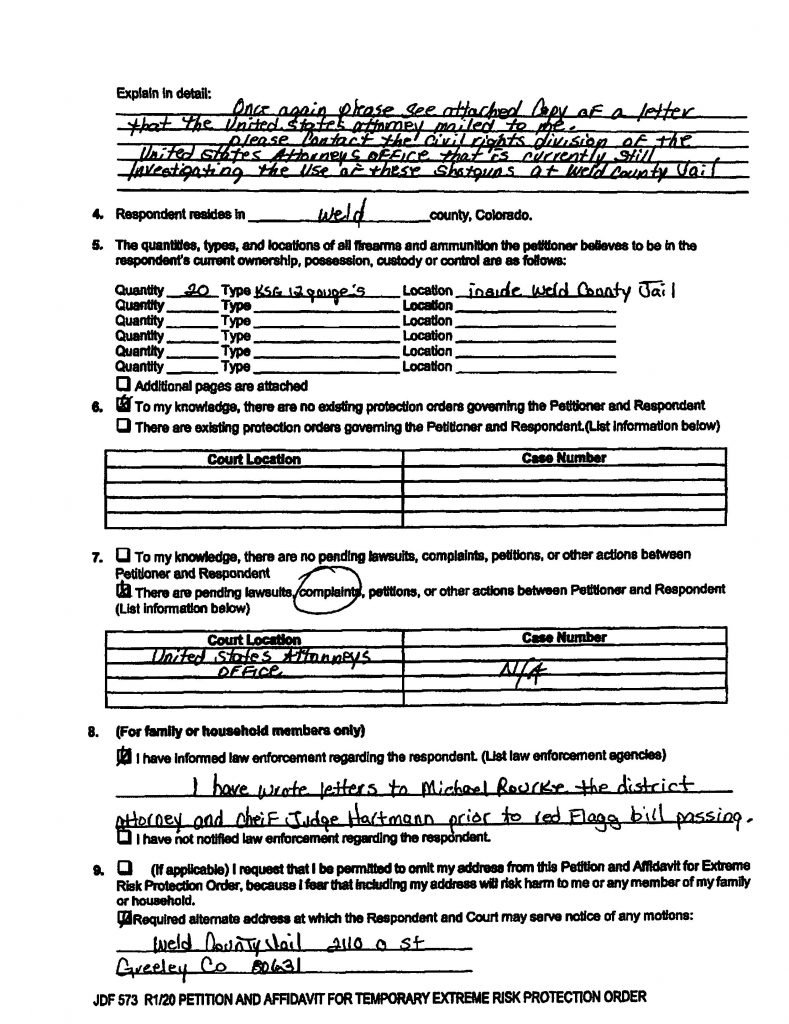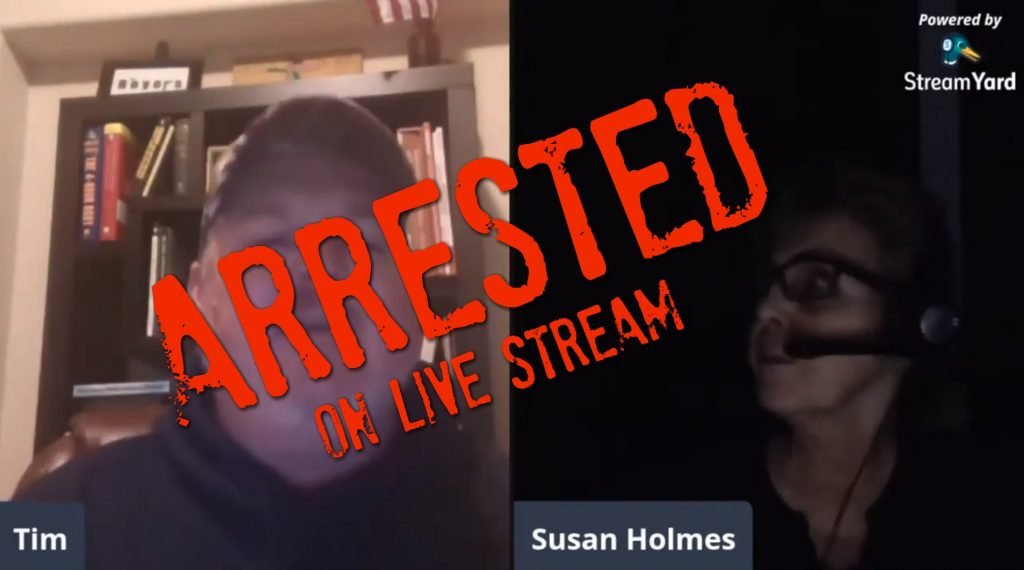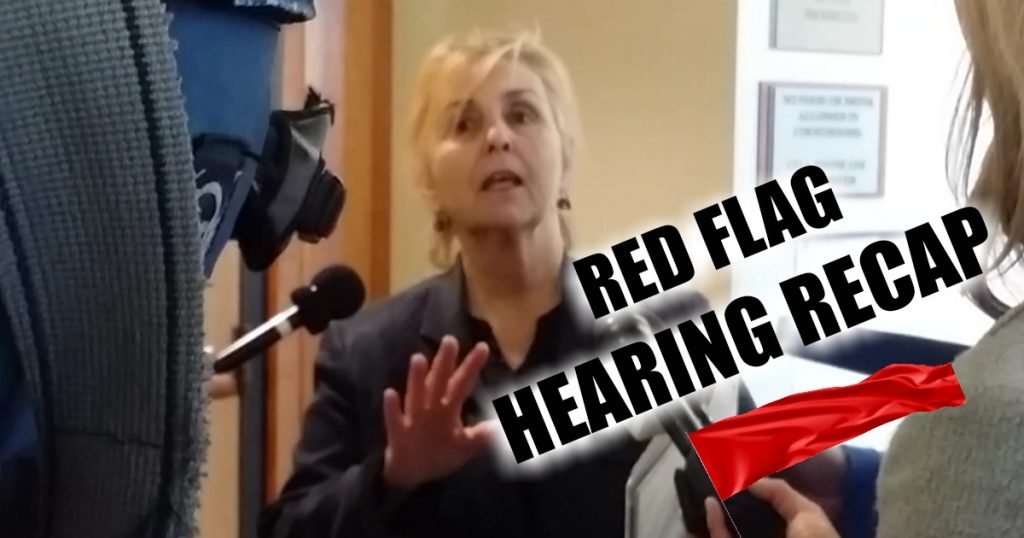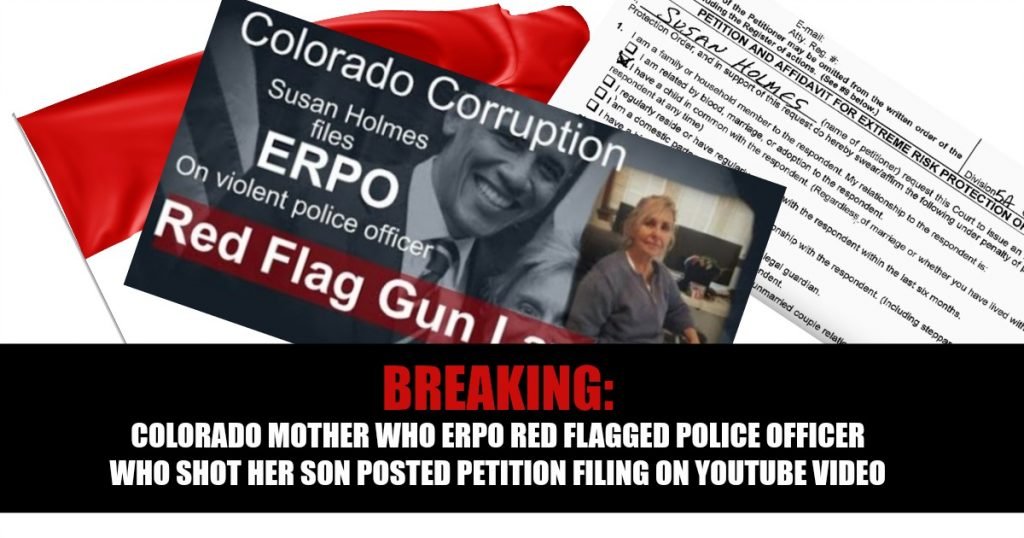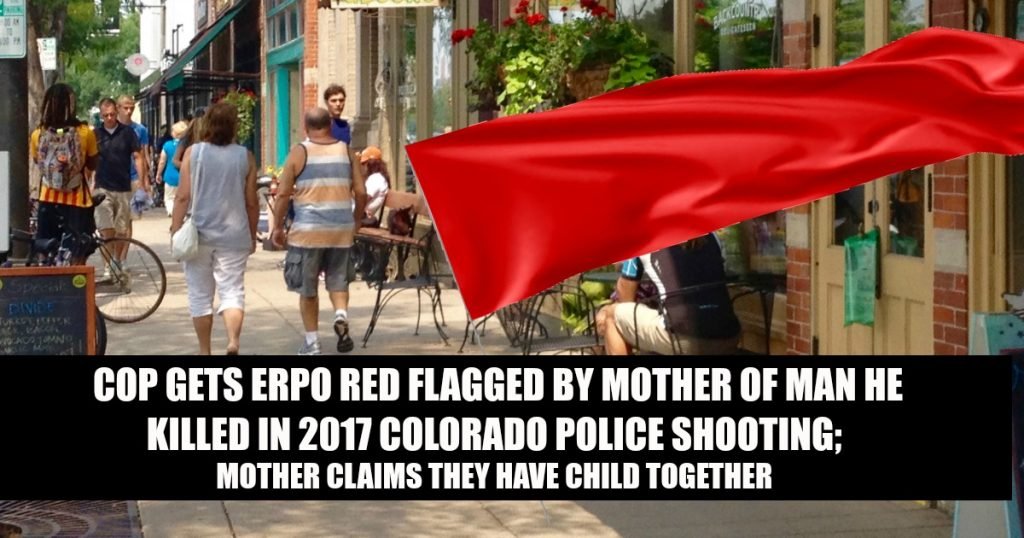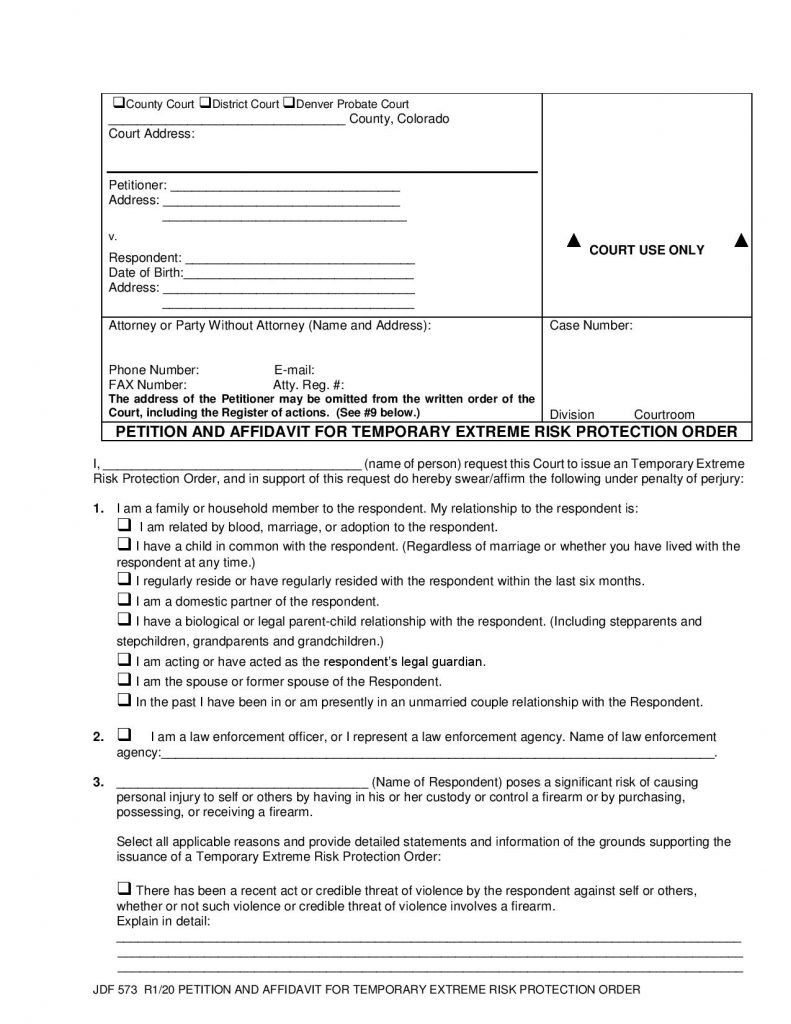One of Colorado’s most outspoken critics of Colorado’s Red Flag ERPO law, Weld County Sheriff Steve Reams, has been red flagged using the new Extreme Risk Protection Order (ERPO) law – and it was an inmate who has been incarcerated in his jail since 2016 on serious drug trafficking charges who filed it – from jail.
On February 25, 2020 the inmate filed the petition. On the petition, which is public record, the inmate claims he falls under the law’s extremely broad definition of ‘household or family member’ by marking the box “I regularly reside or have resided with the respondent in the last 6 months”. I suppose there may be some validity to this, as he is housed in Sheriff Reams’ jail.
In the body of the petition the inmate states that “Sheriff Steve Reams is the rudder of the ship, and that ship being the S.O.G. who carry shotguns inside the jail”. According to the inmate, these deputies carry these “deadly weapons 24 hours a day intimidating and threatening people for the most minor things, such as get on your bed.” You can read the entire petition below.
The Weld County jail S.O.G. (Special Operations Group) is responsible for maintaining order in situations involving enhanced security risk. The “shotguns” they carry are actually devices that fire less-than-lethal projectiles and are only carried by the specialized team of officers.
The petition was dismissed as soon as it landed on the desk of Judge James F. Hartmann, without allowing a temporary hearing where the petitioner would be present but the respondent would not be, and the case decided based on a preponderance of evidence. The judge wrote an in depth statement as part of his dismissal order which in conclusion stated that the petitioner failed to provide any facts that either Sheriff Reams or his deputies were a “significant risk of causing personal injury to themselves or others in the immediate future” as is required by the law, and that the allegations made were not against any specific individual or Sheriff Reams himself, but instead were an attempt to prevent peace officers from carrying firearms within the jail. The judge refused to address the threshold question of whether or not his residency inside the jail made him a qualifying petitioner.
In a radio interview with Peter Boyles of 710 KNUS today, Sheriff Reams said he found out about the petition when the dismissal order was emailed to him while he was out of town. This is because according to the law the person being Red Flagged, the respondent, is not informed of the proceeding until AFTER the first hearing has taken place.
This is the second ERPO filed against a member of law enforcement since the Colorado law took effect January 1, 2020. The first was filed on January 9, 2020 by Fort Collins resident, Susan Holmes, against a Colorado State University Police Officer who fatally shot her son in 2017. Her son was carrying an 11 1/2″ bayonet hunting knife and had lunged at the officer before he was killed. After a circus of a hearing, Holmes was charged with perjury for marking the box on her petition stating she was a ‘household or family member’ because her and the officer had a child in common. It is far less clear if perjury charges in this new case filed against Reams would stick, as “residency” is not really defined within the scope of the law.
Weld County is one of Colorado’s ten largest counties with a large land mass and diverse demographic.
I myself hold law enforcement to high standards when it comes to excessive force, therefore I feel it should be noted Weld is one of only a few counties where the DA refuses to sign off on no-knock raids, and Sheriff Reams has a record of taking swift action in cases of excessive force. In November 2019, two Weld County deputies were fired and one resigned after video surfaced of them using excessive force during an interrogation when the suspect refused to cooperate. Two of them had been with the sheriff’s office for 15 years. One of the deputies was charged with third degree assault.
Sheriff Reams has been sounding the alarm for over a year now on how Colorado’s poorly written Red Flag law can easily be abused and now he has lived it first hand. He made international news when he told CNN he’d rather sit in his own jail in contempt than enforce an unconstitutional and dangerous Red Flag order. Reams has been a great ally to us here at Rally for our Rights, even joining us on stage to speak against the Red Flag ERPO law at rallies as well as teaching seminars on the dangers of the law to gun owners and other concerned citizens. He also helped lead the Second Amendment Sanctuary movement here in Colorado, of which more than half the state’s counties joined.
A burning question of mine that I’ve brought up many times: Why are these free to file? Even a small filing fee would deter the most frivolous of cases. Nothing else in the court system is free to file and even a Temporary Restraining Order is $97.
Proponents of Red Flag laws will undoubtedly point to this case as “working as it intended” since no one had their guns seized or their rights violated. I would argue against that in several ways. First, what an absolute waste of court time and taxpayer resources. Second, how scary is it that these petitions are THIS easy to file? And third, just as we saw in the Susan Holmes case, we’re again seeing how high profile individuals are naturally awarded protection from the abuses of the law. If this had been an average citizen, unknown to the judge, and someone they had let crash on their couch for a couple weeks, we’d have a completely different story to tell. And honestly, that is playing out in Colorado already. This case is the eighteenth ERPO filed in less than two months and a repeal bill has been introduced into the Colorado State Legislature. That bill will get it’s first hearing on March 12, 2020.
To learn more about Colorado’s Red Flag Law, obtain attorney resources, and/or report if you’re Red Flagged, visit www.redflagresourcecenter.com.
The Right to Keep and Bear Arms must always be defended!
Get a sticker for a donation to Rally for our Rights of $5 or more.
CLICK HERE TO GET YOURS
(other designs available)


